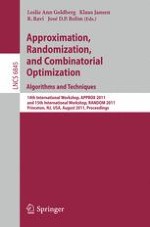2011 | OriginalPaper | Buchkapitel
Optimal Lower Bounds for Universal and Differentially Private Steiner Trees and TSPs
verfasst von : Anand Bhalgat, Deeparnab Chakrabarty, Sanjeev Khanna
Erschienen in: Approximation, Randomization, and Combinatorial Optimization. Algorithms and Techniques
Verlag: Springer Berlin Heidelberg
Aktivieren Sie unsere intelligente Suche, um passende Fachinhalte oder Patente zu finden.
Wählen Sie Textabschnitte aus um mit Künstlicher Intelligenz passenden Patente zu finden. powered by
Markieren Sie Textabschnitte, um KI-gestützt weitere passende Inhalte zu finden. powered by
Given a metric space on
n
points, an
α
-approximate
universal
algorithm for the Steiner tree problem outputs a distribution over rooted spanning trees such that for any subset
X
of vertices containing the root, the expected cost of the induced subtree is within an
α
factor of the optimal Steiner tree cost for
X
. An
α
-approximate
differentially private
algorithm for the Steiner tree problem takes as input a subset
X
of vertices, and outputs a tree distribution that induces a solution within an
α
factor of the optimal as before, and satisfies the additional property that for any set
X
′ that differs in a single vertex from
X
, the tree distributions for
X
and
X
′ are “close” to each other. Universal and differentially private algorithms for TSP are defined similarly. An
α
-approximate universal algorithm for the Steiner tree problem or TSP is also an
α
-approximate differentially private algorithm. It is known that both problems admit
O
(log
n
)-approximate universal algorithms, and hence
O
(log
n
) approximate differentially private algorithms as well.
We prove an Ω(log
n
) lower bound on the approximation ratio achievable for the universal Steiner tree problem and the universal TSP, matching the known upper bounds. Our lower bound for the Steiner tree problem holds even when the algorithm is allowed to output a more general solution of a distribution on paths to the root. We then show that whenever the universal problem has a lower bound that satisfies an additional property, it implies a similar lower bound for the differentially private version. Using this converse relation between universal and private algorithms, we establish an Ω(log
n
) lower bound for the differentially private Steiner tree and the differentially private TSP. This answers a question of Talwar [19]. Our results highlight a natural connection between universal and private approximation algorithms that is likely to have other applications.
